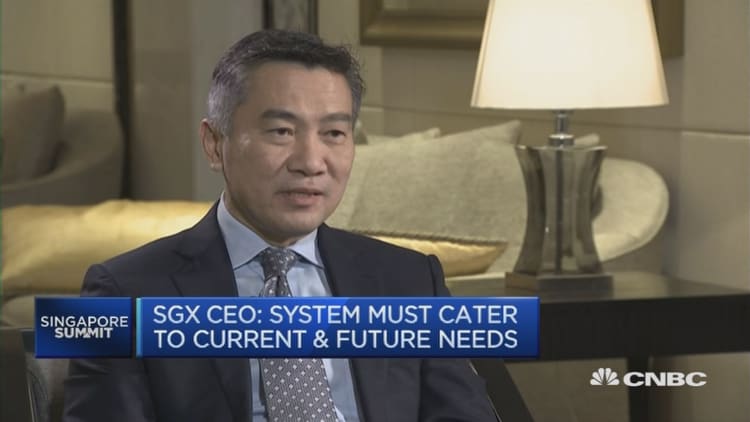Departures from Singapore's sole stock exchange — which made headlines last year when several prominent companies exited — have continued into 2017, and it remains to be seen whether new listings could catch up.
So far this year, 10 companies have delisted from the Singapore Exchange (SGX), according to data that CNBC compiled from SGX filings. That figure could more than double by year end given that at least 10 other companies have announced acquisition offers or are being asked by the exchange to exit for failing to meet listing rules.
In comparison, there have only been four initial public offerings this year.
Companies leaving stock exchanges are common occurrences worldwide, but the spate of departures in Singapore coincided with a dearth of IPOs, low confidence in the local equities market and a decline in trading volume. As a result, the exits strengthened the perception that the city state is losing its appeal as a listing destination.
Loh Boon Chye, chief executive of SGX, said the situation is less severe if one compares the total funds raised versus the value of companies that left. Last year, the exchange raised 13.2 billion Singapore dollars ($9.5 billion) through IPOs, reverse takeovers, secondary listings, rights issues and placements; while it lost 13.4 billion Singapore dollars ($9.6 billion) from delistings.
"One can focus purely on the number of listings versus the number of delistings... I think it's important to look at funds raised as an additional parameter," Loh said at the exchange's earnings briefing last Thursday evening.
Prominent Singapore businesses were among the 30 companies that left the SGX last year, including shipping firm Neptune Orient Lines and public transport operator SMRT Corp, according to data compiled by CNBC. That outnumbered the 16 IPOs in the same year.
Reasons cited by the companies were wide-ranging: from wanting greater management control to high costs of staying public and poor financial performance. For those who chose to turn private, Barry Lee, KPMG Singapore's head of capital markets group, said the lackluster economy played a part.
"Major considerations include the ability to attract the optimal valuation by being listed due to the generally subdued economic climate of recent years and the increased regulatory compliance burden and associated costs from a listing, such as listing fees and compliance requirements, director fees, professional fees," Lee told CNBC.
"Staying private also provides more flexibility for the management team to manage the growth of their business," he added.
But things could be looking up for SGX this year. Aside from the exchange's various efforts to boost confidence and trading liquidity bearing fruit, global IPO activity has also picked up, experts said.

Loh announced last Thursday that the exchange's securities daily average value — a measure of trading activity — rose to a four-year high of 1.24 billion Singapore dollars ($890 million) in the first quarter of this year. He added that the IPO pipeline for 2017 is also better than it's been the past two years.
"I cannot look forward to know how many delistings there will be. I can tell you my pipeline of potential IPOs is better than what it was, so that's the relative comparison," he said.
Max Loh, EY ASEAN and Singapore managing partner, said Singapore could benefit from the global recovery in fund raising activities. An EY report said the first quarter of 2017 saw 369 IPOs raising $33.7 billion, which is a 92 per cent year-over-year increase in the number of IPOs and a 146 percent jump in proceeds.
"The outlook for the Singapore IPO market remains positive, and there is a continued pipeline of companies wanting to list on the SGX. Ultimately, local entrepreneurial companies have a penchant to list on SGX as a platform for growth. The sectors with listing potential in Singapore include consumer products, industrials, health care and REITs," he said.


